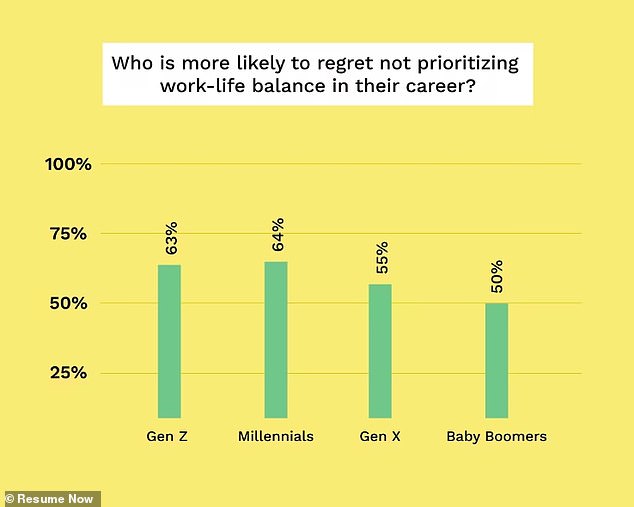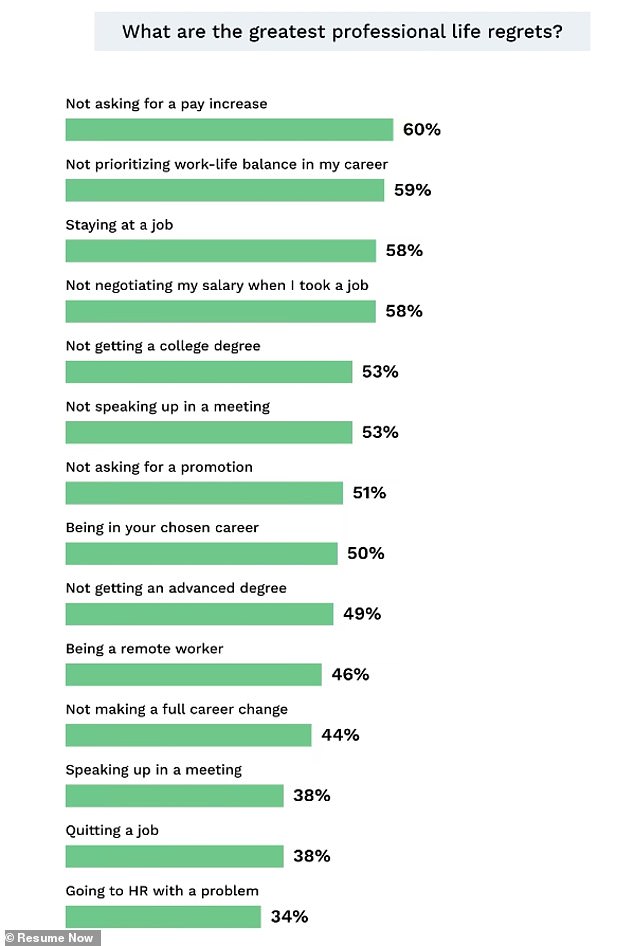The old adage goes people on their deathbed never wish they had spent more time at the office – and a new survey found it’s true, at least, for 59 percent of workers.
A poll of 1,000 employees from across the United States, the UK, France and Germany, discovered that nearly three-fifths of respondents, of all ages, say they regret failing to ‘prioritize work-life balance in one’s career.’
And it was Gen Z and Millennial respondents, the survey said, who reported the regret more than any other age group.
The statistic was beaten by only one other top regret among the one thousand workers polled: exactly three-fifths or 60 percent wished they had asked for a raise.
But a larger pattern emerged across the volley of questions and answers, according to one of the career and resume-writing experts behind the new survey.
‘People who have played it safe, by staying in an unsatisfying role or not asking for a raise,’ career expert Heather O’Neill said, ‘have more regrets than those who acted and worked to change their situation for the better.’

Nearly three-fifths of respondents, of all age groups combined, said that they regret failing to ‘prioritize work-life balance in one’s career.’ But it was Gen Z and Millennial respondents who reported the regret more than any other age group (see chart above)


But a larger pattern emerged across the volley of questions and answers, according to one of the career and resume-writing experts behind the new survey. ‘People who have played it safe, by staying in an unsatisfying role or not asking for a raise,’ one expert said, ‘have more regrets’
All told, a super-majority of 66 percent of survey respondents held some form of workplace regret – but the mid-career age groups, Millennials (70 percent) and Gen X (69 percent), reported the most regrets overall.
People starting out their careers, like Gen Z (61 percent), and those headed into retirement, like the Baby Boomers (52 percent), reported having less regrets.
And across gender lines, male respondents reported that they regretted quitting a job more often than female respondents (44 percent vs 34 percent).
The survey was commissioned by Resume Now, which promises to assist prospective employees market themselves better during their job hunt.
The company offers a variety of career coaching and professional resume writing services, although some users on Reddit have posted complaints about Resume Now’s subscription model and auto-billing practices.
‘Lesson learned to check your bank statements, consistently,’ as one Reddit user posted in February, expressing in a way their own career-related, job-hunting regret.

Resume Now’s survey found that ‘pro-active’ regrets of this kind were less common than regrets of inaction: 58 percent of respondents, for example, wished they hadn’t stuck around in a job they didn’t like, while only 38 percent regretted quitting
Resume Now’s survey found that ‘pro-active’ regrets of this kind were less common than regrets of inaction: 58 percent of respondents, for example, wished they hadn’t stuck around in a job they didn’t like, while only 38 percent regretted quitting.
More than half, 53 percent reported that they ‘have regretted not speaking up in a meeting,’ versus only 38 percent who ‘regretted speaking up in a meeting.’
Fortunately, as O’Neill noted, ‘If you suffer from career regrets, it’s not too late to rectify them […] Changes don’t happen on their own.’
And over half of the Resume Now survey’s respondents (55 percent) revealed that they had at least one career-related resolution for 2024.
For nearly all of those (54 percent) learning a new skill was high on the list, while many others (45 percent) said they were hoping to find a new job.
About a quarter of respondents had pledge to themselves to improve their professional standing, be it with a new professional certification (23 percent), growing their network of professional contacts (25 percent), or something else.
And roughly a fifth of the international pool of American, British, French and German workers surveyed said that they planned – or hoped – to make a big career change in 2024 (19 percent) and/or specifically find a new job that was amenable to remote work (18 percent).
And yet, despite the issue being the top workplace regret across all of these four countries, only 21 percent of the survey’s respondents reported that 2024 would finally be the year that they planned to ask for a raise.











